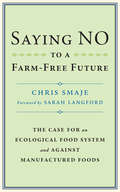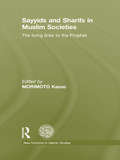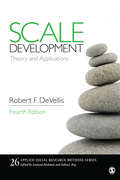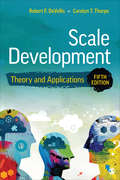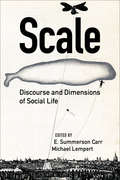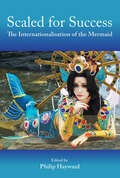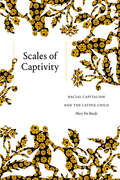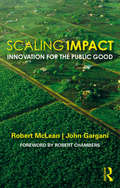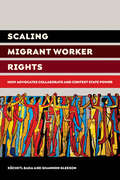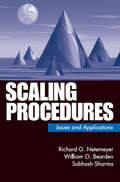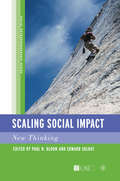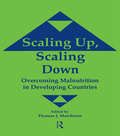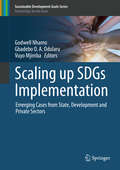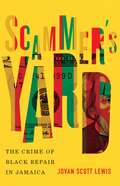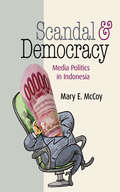- Table View
- List View
Saying NO to a Farm-Free Future: The Case For an Ecological Food System and Against Manufactured Foods
by Chris Smaje&“Everyone in the food business needs to read this book. . . . [A] lively and superbly written polemic.&”—Joel Salatin, co-founder of Polyface FarmNamed the Inc. Non-Obvious Book Awards "Best Books of 2023"A defense of agroecological, small-scale farming and a robust critique of an industrialized future.One of the few voices to challenge The Guardian's George Monbiot on the future of food and farming (and the restoration of nature) is academic, farmer and author of A Small Farm Future Chris Smaje. In Saying NO to a Farm-Free Future, Smaje presents his defense of small-scale farming and a robust critique of Monbiot&’s vision for an urban and industrialized future.Responding to Monbiot&’s portrayal of an urban, high-energy, industrially manufactured food future as the answer to our current crises, and its unchallenged acceptance within the environmental discourse, Smaje was compelled to challenge Monbiot&’s evidence and conclusions. At the same time, Smaje presents his powerful counterargument – a low-carbon agrarian localism that puts power in the hands of local communities, not high-tech corporates.In the ongoing fight for our food future, this book will help you to understand the difference between a congenial, ecological living and a dystopian, factory-centered existence. A must-read!"Chris Smaje has laid down an indictment – as unremitting as it is undeniable – that cuts through the jargon-filled, techno-worshipping agricultural futurists who promise silver-bullet fixes for having your cake and eating it too. This brilliant and compelling book is at once hopeful and persuasive about the future of food."—Dan Barber, chef at Blue Hill and author of The Third Plate
Saying No to Hate: Overcoming Antisemitism in America
by Norman H. FinkelsteinSaying No to Hate grounds readers contextually in the history of antisemitism in America by emphasizing the legal, political, educational, communal, and other strategies American Jews have used through the centuries to address high-profile threats. Norman H. Finkelstein shows how antisemitism has long functioned in America in systemic, structural, and interpersonal ways, from missionaries, the KKK, and American Nazis to employment discrimination, social media attacks, and QAnon. He explains how historic antisemitic events such as General Ulysses S. Grant&’s General Order No. 11 (1862); the Massena, New York blood libel (1928); and the mass shooting at the Tree of Life synagogue (2018) galvanized the Jewish community. Finkelstein shines light on Jews such as Louis Brandeis and Admiral Hyman Rickover who succeeded despite discrimination and on individuals and organizations that have tackled legal and security affairs, from the passage of Maryland&’s Jew Bill (1826) to groups helping Jewish institutions better protect themselves from active shooter threats. Far from a victim narrative, Saying No to Hate is as much about Jewish resilience and ingenuity as it is about hatred. Engaging high school students and adults with personal narratives, it prepares each of us to recognize, understand, and confront injustice and hatred today, in the Jewish community and beyond.
Sayonara Amerika, Sayonara Nippon: A Geopolitical Prehistory of J-Pop (Asia Perspectives: History, Society, and Culture)
by Michael BourdaghsFrom the beginning of the American Occupation in 1945 to the post-bubble period of the early 1990s, popular music provided Japanese listeners with a much-needed release, channeling their desires, fears, and frustrations into a pleasurable and fluid art. Pop music allowed Japanese artists and audiences to assume various identities, reflecting the country's uncomfortable position under American hegemony and its uncertainty within ever-shifting geopolitical realities. In the first English-language study of this phenomenon, Michael K. Bourdaghs considers genres as diverse as boogie-woogie, rockabilly, enka, 1960s rock and roll, 1970s new music, folk, and techno-pop. Reading these forms and their cultural import through music, literary, and cultural theory, he introduces readers to the sensual moods and meanings of modern Japan. As he unpacks the complexities of popular music production and consumption, Bourdaghs interprets Japan as it worked through (or tried to forget) its imperial past. These efforts grew even murkier as Japanese pop migrated to the nation's former colonies. In postwar Japan, pop music both accelerated and protested the commodification of everyday life, challenged and reproduced gender hierarchies, and insisted on the uniqueness of a national culture, even as it participated in an increasingly integrated global marketplace. Each chapter in Sayonara Amerika, Sayonara Nippon examines a single genre through a particular theoretical lens: the relation of music to liberation; the influence of cultural mapping on musical appreciation; the role of translation in transmitting musical genres around the globe; the place of noise in music and its relation to historical change; the tenuous connection between ideologies of authenticity and imitation; the link between commercial success and artistic integrity; and the function of melodrama. Bourdaghs concludes with a look at recent Japanese pop music culture.
Sayyids and Sharifs in Muslim Societies: The Living Links to the Prophet (New Horizons in Islamic Studies)
by Morimoto KazuoThe global Muslim population includes a large number of lineal descendants and relatives of the Prophet Muhammad. These kinsfolk, most often known as "sayyid" or "sharif," form a distinct social category in many Muslim societies, and their status can afford them special treatment in legal matters and in the political sphere. This book brings together an international group of renowned scholars to provide a comprehensive examination of the place of the kinsfolk of Muhammad in Muslim societies, throughout history and in a number of different local manifestations. The chapters cover: how the status and privileges of sayyids and sharifs have been discussed by religious scholars how the prophetic descent of sayyids and sharifs has functioned as a symbolic capital in different settings the lives of actual sayyids and sharifs in different times and places Providing a thorough analysis of sayyids and sharifs from the ninth century to the present day, and from the Iberian Peninsula to the Indonesian Archipelago, this book will be of great interest to scholars of Islamic studies, Middle East and Asian studies.
Scala Radio's A Soundtrack for Life: Classical Music to Take You Through the Day
by Scala RadioBringing together much-loved masterpieces with exciting new works, this accessible and inspiring guide is a celebration of classical music. With pieces ranging from Vaughan Williams's The Lark Ascending and Beethoven's Pastoral Symphony to the scores for Avatar and Assassin's Creed, each entry puts the piece of music into context, providing fascinating insights into the inspirations behind each work and enhancing your listening experience. Organised into Occasions and Themes, the book features music to accompany you through your day, from getting up and getting dressed to running, reading, walking the dog, cooking, taking a bath, going to sleep and everything in between. You'll also find expert curations of the world's most romantic music and the greatest Christmas choral works as well as compositions that celebrate the natural world and mark births and marriages. Perfect for classical music enthusiasts as well as anyone looking for an enjoyable introduction to this genre, this is the definitive modern guide to classical music.
Scala Radio's A Soundtrack for Life: Classical Music to Take You Through the Day
by Scala RadioBringing together much-loved masterpieces with exciting new works, this accessible and inspiring guide is a celebration of classical music. With pieces ranging from Vaughan Williams's The Lark Ascending and Beethoven's Pastoral Symphony to the scores for Avatar and Assassin's Creed, each entry puts the piece of music into context, providing fascinating insights into the inspirations behind each work and enhancing your listening experience. Organised into Occasions and Themes, the book features music to accompany you through your day, from getting up and getting dressed to running, reading, walking the dog, cooking, taking a bath, going to sleep and everything in between. You'll also find expert curations of the world's most romantic music and the greatest Christmas choral works as well as compositions that celebrate the natural world and mark births and marriages. Perfect for classical music enthusiasts as well as anyone looking for an enjoyable introduction to this genre, this is the definitive modern guide to classical music.
Scalar Mismatches in Metropolitan Water Governance: A Comparative Study of São Paulo and Mexico City (Water Governance - Concepts, Methods, and Practice)
by Francine van den BrandelerThe book provides insights into the particular nature of water-related challenges in metropolitan regions of the Global South and the “scalar mismatches” that prevent their sustainable and inclusive development. It argues for the adoption of a metropolitan water governance approach to assess these challenges, including the drivers and institutions that shape these, and the policy instruments at river basin and urban scales that aim to address these. The cases of Mexico City and São Paulo, as two mega-cities with a wide ranging of water-related challenges, present lessons to other fast growing urban agglomerations on the variety of possible responses as well as obstacles to their effectiveness that receive little attention.
Scale
by Andrew HerodGeographical scale is a central concept enabling us to make sense of the world we inhabit. Amongst other things, it allows us to declare one event or process a national one and another a global or regional one. However, geographical scales and how we think about them are profoundly contested, and the spatial resolution at which social processes take place – local, regional or global – together with how we talk about them has significant implications for understanding our world. Scale provides a structured investigation of the debates concerning the concept of scale and how various geographical scales have been thought about within critical social theory. Specifically, the author examines how the scales of the body, the urban, the regional, the national, and the global have been conceptualized within Geography and the social sciences more broadly. The first part of the book provides a comprehensive overview of how different theoretical perspectives have regarded scale, especially debates over whether scales are real things or merely mental contrivances and/ or logical devices with which to think, as well as the consequences of thinking of them in areal versus in networked terms. The subsequent five chapters of the book then each takes a particular scale: the body; the urban; the regional; the national; the global and explores how it has been conceptualized and represented discursively for political and other purposes. A brief conclusion draws the book together by posing a number of questions about scale which emerge from the foregoing discussion. The first single-author volume ever written on the subject of geographical scale, this book provides a unique overview in pushing understandings of scale in new and original directions. The accessible text is complimented by didactic boxes, and Scale serves as a valuable pedagogical reference for undergraduate and postgraduate audiences wishing to become familiar with such theoretical issues.
Scale Development: Theory and Applications (Applied Social Research Methods #26)
by Dr Robert F. DeVellisIn the Fourth Edition of Scale Development, Robert F. DeVellis demystifies measurement by emphasizing a logical rather than strictly mathematical understanding of concepts. The text supports readers in comprehending newer approaches to measurement, comparing them to classical approaches, and grasping more clearly the relative merits of each. This edition addresses new topics pertinent to modern measurement approaches and includes additional exercises and topics for class discussion.
Scale Development: Theory and Applications (Applied Social Research Methods #26)
by Dr Robert F. DeVellisIn the Fourth Edition of Scale Development, Robert F. DeVellis demystifies measurement by emphasizing a logical rather than strictly mathematical understanding of concepts. The text supports readers in comprehending newer approaches to measurement, comparing them to classical approaches, and grasping more clearly the relative merits of each. This edition addresses new topics pertinent to modern measurement approaches and includes additional exercises and topics for class discussion.
Scale Development: Theory and Applications (Applied Social Research Methods)
by Robert F. DeVellis Carolyn T. ThorpeScale Development: Theory and Applications, by Robert F. DeVellis and new co-author Carolyn T. Thorpe, demystifies measurement by emphasizing a logical rather than strictly mathematical understanding of concepts. The Fifth Edition includes a new chapter that lays out the key concepts that distinguish indices from scales, contrasts various types of indices, suggests approaches for developing them, reviews validity and reliability issues, and discusses in broad terms some analytic approaches. All chapters have been updated, and the book strikes a balance between including relevant topics and highlighting recent developments in measurement while retaining an accessible, user-friendly approach to the material covered.
Scale Development: Theory and Applications (Applied Social Research Methods)
by Robert F. DeVellis Carolyn T. ThorpeScale Development: Theory and Applications, by Robert F. DeVellis and new co-author Carolyn T. Thorpe, demystifies measurement by emphasizing a logical rather than strictly mathematical understanding of concepts. The Fifth Edition includes a new chapter that lays out the key concepts that distinguish indices from scales, contrasts various types of indices, suggests approaches for developing them, reviews validity and reliability issues, and discusses in broad terms some analytic approaches. All chapters have been updated, and the book strikes a balance between including relevant topics and highlighting recent developments in measurement while retaining an accessible, user-friendly approach to the material covered.
Scale: Discourse and Dimensions of Social Life
by E. Summerson CarrA free ebook version of this title is available through Luminos, University of California Press's new open access publishing program. Visit www.luminosoa.org to learn more. Wherever we turn, we see diverse things scaled for us, from cities to economies, from history to love. We know scale by many names and through many familiar antinomies: local and global,micro and macroevents to name a few. Even the most critical among us often proceed with our analysis as if such scales were the ready-made platforms of social life, rather than asking how, why, and to what effect are scalar distinctions forged in the first place. How do scalar distinctions help actors and analysts alike make sense of and navigate their social worlds? What do these distinctions reveal and what do they conceal? How are scales construed and what effects do they have on the way those who abide by them think and act? This pathbreaking volume attends to the practical labor of scale-making and the communicative practices this labor requires. From an ethnographic perspective, the authors demonstrate that scale is practice and process before it becomes product, whether in the work of projecting the commons, claiming access to the big picture, or scaling the seriousness of a crime.
Scaled for Success: The Internationalisation of the Mermaid
by Philip Hayward“This wonderful book asks us to consider the mermaid . . . across regions, nations, diasporas, and contemporary socio-cultural configurations.” —Paige West, Claire Tow Professor of Anthropology, Barnard College, Columbia UniversityEmerging from the confluence of Greco-Roman mythology and regional folklore, the mermaid has been an enduring motif in Western culture since the medieval period. It has also been disseminated more widely, initially through Western trade and colonization and, more recently, through the increasing globalization of media products and outlets.Scaled for Success offers the first detailed overview of the mermaid’s dispersal outside Europe. Complementing previous studies of the interrelationship between the mermaid and Mami Wata spirit in West Africa, this volume addresses the mermaid’s presence in a range of Middle Eastern, Asian, Australian, Latin American and North American contexts. Individual chapters identify the manner in which the mermaid has been variously syncretized and/or resignified in contexts as diverse as Indian public statuary, Thai cinema and Coney Islands annual Mermaid Parade.Rather than lingering as a relic of a bygone age, the mermaid emerges as a versatile, dynamic and, above all, polyvalent figure. Her prominence exemplifies the manner in which contemporary media-lore has extended the currency of established folkloric figures in new and often surprising ways. Analyzing aspects of religious symbolism, visual art, literature and contemporary popular culture, this copiously illustrated volume profiles an intriguing and highly diverse phenomenon.“No matter the reader’s background (literature, folklore, media or cultural studies, and beyond), there is no denying that this work will be a valuable addition to the library of anyone fascinated with mermaids.” —Western Folklore
Scales of Captivity: Racial Capitalism and the Latinx Child
by Mary Pat BradyIn Scales of Captivity, Mary Pat Brady traces the figure of the captive or cast-off child in Latinx and Chicanx literature and art between chattel slavery’s final years and the mass deportations of the twenty-first century. She shows how Latinx expressive practices expose how every rescaling of economic and military power requires new modalities of capture, new ways to bracket and hedge life. Through readings of novels by Helena María Viramontes, Oscar Casares, Lorraine López, Maceo Montoya, Reyna Grande, Daniel Peña, and others, Brady illustrates how submerged captivities reveal the way mechanisms of constraint such as deportability ground institutional forms of carceral modernity and how such practices scale relations by naturalizing the logic of scalar hierarchies underpinning racial capitalism. By showing how representations of the captive child critique the entrenched logic undergirding colonial power, Brady challenges racialized modes of citizenship while offering visions for living beyond borders.
Scaling Impact: Innovation for the Public Good
by Robert McLean John GarganiScaling Impact introduces a new and practical approach to scaling the positive impacts of research and innovation. Inspired by leading scientific and entrepreneurial innovators from across Africa, Asia, the Caribbean, Latin America, and the Middle East, this book presents a synthesis of unrivalled diversity and grounded ingenuity. The result is a different perspective on how to achieve impact that matters, and an important challenge to the predominant more-is-better paradigm of scaling. For organisations and individuals working to change the world for the better, scaling impact is a common goal and a well-founded aim. The world is changing rapidly, and seemingly intractable problems like environmental degradation or accelerating inequality press us to do better for each other and our environment as a global community. Challenges like these appear to demand a significant scale of action, and here the authors argue that a more creative and critical approach to scaling is both possible and essential. To encourage uptake and co-development, the authors present actionable principles that can help organisations and innovators design, manage, and evaluate scaling strategies. Scaling Impact is essential reading for development and innovation practitioners and professionals, but also for researchers, students, evaluators, and policymakers with a desire to spark meaningful change.
Scaling Migrant Worker Rights: How Advocates Collaborate and Contest State Power
by Shannon GleesonA free ebook version of this title is available through Luminos, University of California Press’s Open Access publishing program. Visit www.luminosoa.org to learn more. As international migration continues to rise, sending states play an integral part in "managing" their diasporas, in some cases even stepping in to protect their citizens' labor and human rights in receiving states. At the same time, meso-level institutions—including labor unions, worker centers, legal aid groups, and other immigrant advocates—are among the most visible actors holding governments of immigrant destinations accountable at the local level. The potential for a functional immigrant worker rights regime, therefore, advocates to imagine a portable, universal system of justice and human rights, while simultaneously leaning on the bureaucratic minutiae of local enforcement. Taking Mexico and the United States as entry points, Scaling Migrant Worker Rights analyzes how an array of organizations put tactical pressure on government bureaucracies to holistically defend migrant rights. The result is a nuanced, multilayered picture of the impediments to and potential realization of migrant worker rights.
Scaling Procedures: Issues and Applications
by Dr Richard G. Netemeyer Dr William O. Bearden Dr Subhash SharmaScaling Procedures: Issues and Applications examines the issues involved in developing and validating multi-item self-report scales of latent constructs. Distinguished researchers and award-winning educators Richard G. Netemeyer, William O. Bearden, and Subhash Sharma present a four-step approach for multi-indicator scale development. With these steps, the authors include relevant empirical examples and a review of the concepts of dimensionality, reliability, and validity. Scaling Procedures: Issues and Applications supplies cutting-edge strategies for developing and refining measures. Providing concise chapter introductions and summaries, as well as numerous tables, figures, and exhibits, the authors present recommended steps and overlapping activities in a logical, sequential progression.
Scaling Social Impact: New Thinking (Social Entrepreneurship Series)
by P. Bloom E. SklootMany social entrepreneurs struggle to take successful, innovative programs that address social problems on a local or limited basis and scale them up to expand their impact in a more widespread, deeper, and efficient way. In Scaling Social Impact , the editors address this issue with a comprehensive collection of original papers.
Scaling Up Scaling Down: Overcoming Malnutrition in Developing Countries
by Thomas J. MarchioneThe individual and institutional capacities required for the prevention and reduction of nutritional insecurity and hunger in lesser-developed countries as the twenty-first century approaches are identified in this book. Household nutritional "security" can be defined as the successful The essays in this book champion the idea of increasing, or scaling up, grass roots operations to provide nutritional security, while scaling down the efforts of national and international institutions. Scaling up involves strengthening local capacities to improve and expand upon current successful programs by building upon existing local culture and organizations. This, in turn, enables the programs to strengthen relationships with national governments, international bilateral/multilateral donors, as well as non-governmental organizations. Scaling down concerns the ways and means by which these various organizations encourage and complement the local development. Therefore, as local capacities are scaled up, the national/international control over decisions and functions is, ideally, scaled down. The volume also directly addresses the resultant complication: how to create programs that are both culturally specific and that will flourish well into the future.
Scaling up SDGs Implementation: Emerging Cases from State, Development and Private Sectors (Sustainable Development Goals Series)
by Godwell Nhamo Vuyo Mjimba Gbadebo O. A. OdularuThis volume challenges global leaders and citizenry to do more in order to resource the implementation of the 2030 Agenda for Sustainable Development (AfSD) and its 17 interwoven Sustainable Development Goals (SDGs). Starting from the concept ‘we cannot manage what we cannot measure’, the book presents some cases showing how to draw national level baselines for the domestication and localisation of the SDGs seeking to provide a clear roadmap towards achieving the 2030 AfSD. Scaling up SDGs Implementation is targeted at the United Nations, national and state governments, sub-national governments, the corporate sector and civil society, including higher education institutes, labour groups, non-governmental organisations and youth movements. The book is cognizant of these institutions’ common, but differentiated responsibilities and capabilities within their socio-political, environmental and economic conditions. The book presents case studies of how the corporate sector has been scaling up SDGs implementation, from the tourism sector, insurance, to the aviation and agricultural sectors. To make sure that no one is left behind, the volume includes cases on solutions for pressing environmental and socio-economic problems ranging from cooperatives in Brazil to the conservation of springs in Zimbabwe. The matter of finding synergies between the climate SDG and the Paris Agreement’s Nationally Determined Contributions (NDCs) is elaborated at length. Lastly, the book discusses how institutions of higher education remain critical pillars in SDGs scaling up, with cases of curriculum re-orientation in South Africa to the rolling out of the Women’s University in Africa. In this context, this volume challenges every global citizen and organization to invest every effort into making the implementation of the SDGs a success as we welcome the second four to five year segment down the road to the year 2030.
Scam: Inside Southeast Asia's Cybercrime Compounds
by Ling Li Ivan Franceschini Mark BoA probing investigation of Southeast Asia&’s online scam industry – told through the voices of survivorsRunning the gamut from the infamous &‘pig butchering&’ romance con to sophisticated online extortion and investment fraud, Southeast Asia has emerged as the global hub for cybercrime. Based on years of field research, Scam takes an in-depth look at the history and inner dynamics of the region&’s online scam industry. Revealed are the appalling working conditions — akin to modern slavery — in the hundreds of prisonlike compounds that have mushroomed throughout multiple countries. The result is a shocking exposé of victims forced to be perpetrators, a tragic modern tale.
Scammer's Yard: The Crime of Black Repair in Jamaica
by Jovan Scott LewisTells the story of Jamaican &“scammers&” who use crime to gain autonomy, opportunity, and repair There is romance in stealing from the rich to give to the poor, but how does that change when those perceived rich are elderly white North Americans and the poor are young Black Jamaicans? In this innovative ethnography, Jovan Scott Lewis tells the story of Omar, Junior, and Dwayne. Young and poor, they strive to make a living in Montego Bay, where call centers and tourism are the two main industries in the struggling economy. Their experience of grinding poverty and drastically limited opportunity leads them to conclude that scamming is the best means of gaining wealth and advancement. Otherwise, they are doomed to live in &“sufferation&”—an inescapable poverty that breeds misery, frustration, and vexation. In the Jamaican lottery scam run by these men, targets are told they have qualified for a large loan or award if they pay taxes or transfer fees. When the fees are paid, the award never arrives, netting the scammers tens of thousands of U.S. dollars. Through interviews, historical sources, song lyrics, and court testimonies, Lewis examines how these scammers justify their deceit, discovering an ethical narrative that reformulates ideas of crime and transgression and their relationship to race, justice, and debt. Scammer&’s Yard describes how these young men, seeking to overcome inequality and achieve autonomy, come to view crime as a form of liberation. Their logic raises unsettling questions about a world economy that relegates postcolonial populations to deprivation even while expecting them to follow the rules of capitalism that exacerbate their dispossession. In this groundbreaking account, Lewis asks whether true reparation for the legacy of colonialism is to be found only through radical—even criminal—means.
Scams and Swindlers: Shocking True Stories of the World’s Most Daring Con Artists
by Jamie KingFilled with tales of con artists and their mind-bending schemes, this thrilling compendium of the world's most incredible scams is truly stranger than fiction. From swindlers and imposters to double lives and faked personas, discover the people behind these scams and the lengths they went to in order to commit them.
Scandal and Democracy: Media Politics in Indonesia
by Mary E. McCoySuccessful transitions to enduring democracy are both difficult and rare. In Scandal and Democracy, Mary E. McCoy explores how newly democratizing nations can avoid reverting to authoritarian solutions in response to the daunting problems brought about by sudden change. The troubled transitions that have derailed democratization in nations worldwide make this problem a major concern for scholars and citizens alike.This study of Indonesia's transition from authoritarian rule sheds light on the fragility not just of democratic transitions but of democracy itself and finds that democratization's durability depends, to a surprising extent, on the role of the media, particularly its airing of political scandal and intraelite conflict. More broadly, Scandal and Democracy examines how the media's use of new freedoms can help ward off a slide into pseudodemocracy or a return to authoritarian rule. As Indonesia marks the twentieth anniversary of its democratic revolution of 1998, it remains among the world's most resilient new democracies and one of the few successful democratic transitions in the Muslim world. McCoy explains the media's central role in this change and corroborates that finding with comparative cases from Mexico, Tunisia, and South Korea, offering counterintuitive insights that help make sense of the success and failure of recent transitions to democracy.
